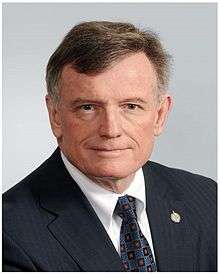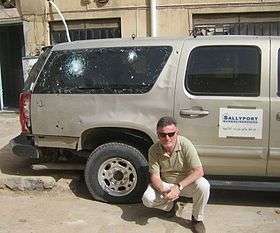David Pratt (politician)
| The Honourable David Pratt PC, BA (Honours), KStG | |
|---|---|
 | |
| Minister of National Defense | |
|
In office December 12, 2003 – July 19, 2004 | |
| Prime Minister | Paul Martin |
| Preceded by | John McCallum |
| Succeeded by | Bill Graham |
| Member of the Canadian Parliament for Nepean—Carleton | |
|
In office June 2, 1997 – June 28, 2004 | |
| Succeeded by | Pierre Poilievre |
| Personal details | |
| Born |
January 3, 1955 Ottawa, Ontario |
| Political party | Liberal |
| Profession | Consultant |
David Pratt, PC (born January 3, 1955) is a former Canadian politician. He was the Member of Parliament for Nepean—Carleton from 1997 until 2004.
Early political career
Before Pratt was elected federally, he served in public office municipally. In 1988, he won a seat on Nepean City Council. His re-election in 1991 also gave him a seat on the Ottawa Carleton Regional Council. In the municipal election of 1994, his candidacy was uncontested and he was acclaimed. On Nepean Council, Pratt served a term as Deputy Mayor and chaired the committees of Public Works and Parks and Recreation. On Regional Council, he worked on transportation and environment issues and was a member of the Ottawa-Carleton Police Services Board and the OC Transpo Commission. He served for five years on the Board of Directors of the Federation of Canadian Municipalities where he was involved in community safety and crime prevention issues, district energy and international development programs in Africa.
National politics
As Minister of National Defence, Pratt received cabinet support for several major procurement projects totaling $7 billion including the Maritime Helicopter Program to replace the aging Sea King fleet, the Mobile Gun System and a new fixed wing search and rescue aircraft. He also obtained federal cabinet approval for the Joint Support Ship program to provide new supply ships for the Canadian Navy. As the local Ottawa cabinet minister, he worked with provincial and municipal officials to assemble $600 million in funding for a proposed light rail transit system – a project that was subsequently cancelled by the City of Ottawa.
As Chair of the Commons Defence Committee, he was a strong advocate for increased military spending both before and after the September 11 attacks in the United States in 2001. Under his leadership, the defence committee released a report entitled: "Facing Our Responsibilities: The state of readiness of the Canadian Forces" which called for substantial new investments in Canada’s military capabilities.[1] As committee chair, Pratt also argued strongly for a more bi-partisan approach to defence issues and for regular reviews of Canadian foreign and defence policy. He successfully sponsored a resolution in Parliament to declare the first Sunday in June “Canadian Forces Day” and contributed to policy debates on defence and security matters with two papers: “Fostering Human Security: A Joint Canada-US Brigade,” (October 2000) and “Does Canada Need A Foreign Intelligence Agency?[2]” (March 2003).
In 1999, Pratt served as a Special Envoy for Lloyd Axworthy, Minister of Foreign Affairs to Sierra Leone and performed the same role for Axworthy’s successor, John Manley. He visited the war torn country on several occasions. He met and held talks with the former Sierra Leonean President Ahmed Tejan Kabbah, and former President Charles Taylor of Liberia, President Lansana Conte of Guinea,There were also meetings and consultations with other senior officials and diplomatic representatives including Revolutionary United Front leader Foday Sankoh. He wrote two reports - “The Forgotten Crisis”[3] (April 1999) and “Sierra Leone: Danger and Opportunity in a Regional Conflict” (July 2001). His recommendations called for more Canadian aid to Sierra Leone and more direct Canadian involvement to bring peace to the region. He also suggested that Liberian President Charles Taylor be investigated by the Special Court for Sierra Leone for war crimes and crimes against humanity for his role in prolonging the regional conflict. Pratt also introduced the first legislation in Canada to certify diamonds under the United Nations sanctioned Kimberley Process to stop the trade in blood diamonds and to protect the integrity of the Canadian diamond industry. Similar government sponsored legislation was eventually passed by Parliament.
An advocate of physical fitness, in July 2003, he completed the grueling four-day 160 kilometer International Four Days Marches Nijmegen with members of the Canadian Forces – the first Canadian Member of Parliament to do so. In the 2004 federal election, he lost his seat to the Conservative candidate, forcing his departure as Defence Minister three weeks later.
Career after politics
Following his electoral loss, Pratt joined the Canadian Red Cross as a Special Advisor in November 2004. He worked on issues related to conflict prevention, small arms and light weapons and international humanitarian law. In 2006, he helped initiate the Canadian Red Cross’s Auxiliary to Government project. The project sought to improve the cooperation between the Canadian Red Cross and governments at all levels in Canada, especially in the area of emergency management. It emphasized the special and distinct role that Red Cross and Red Crescent Societies have under domestic and international law and the Statutes of the International Red Cross and Red Crescent Movement. The project also sought to obtain new legislation to replace the outdated The Canadian Red Cross Society Act, 1909. As the project leader, Pratt authored a discussion paper entitled: "Toward a Renewed Canadian Red Cross – Forging Stronger Partnerships In Support of a Humanitarian Agenda"[4] and the project’s interim report entitled: "Revitalizing the Framework of Cooperation with Public Authorities".[5]

In July 2008, Pratt left the Canadian Red Cross and ran as the Liberal candidate in the riding of Ottawa West—Nepean where he faced incumbent minister John Baird. He received 20,161 votes or 36.1 percent compared to Baird’s 25,109 votes and 44.9 percent of the vote. Following the election, Pratt worked as a consultant. In 2009 and 2010, he spent over five months in Baghdad, Iraq employed by AECOM on the USAID sponsored Iraq Legislative Strengthening Program.[6] Pratt was responsible for organizing an orientation and training program for newly elected Iraqi MPs. He also provided teaching material on legislative committees, the concept of parliamentary privilege and codes of ethics for parliamentarians. In August 2009, a three vehicle convoy in which Pratt and four other colleagues were travelling was hit by an IED. The explosion, which occurred in the Red Zone in Baghdad, caused significant vehicle damage and blew out windows in the surrounding area, but no one was hurt.
In January 2011, Pratt accepted the position of Senior Vice President of Public Affairs with GCI Canada,[7] a public relations and public affairs company with offices in Toronto and Ottawa. In September 2012, Pratt started his own company, David Pratt & Associates, which is a government relations and strategic consulting firm based in Ottawa. His clients have included companies such as CGI, John Deere, Nexter, Huntington Ingalls, the Smith Consulting Group and Caesars Entertainment.
Pratt is a director of the Conference of Defence Associations of Canada, a Senior Fellow and sits on the Advisory Council of the Canadian Defence and Foreign Affairs Institute. He is also an honorary member of the Royal Military College of Canada and serves on the board of directors of Serenity House, a residential substance abuse treatment centre in Ottawa. In October 2014, Pratt was inducted into the Order of St George, the Canadian priory, which traces its roots back to King Kàroly Robert of Hungary in 1326.
He has authored several papers and lectures including: “Re-tooling for New Challenges: Parliaments as Peace-builders”,[8] (June 2005), “Is There a Grand Strategy in Canadian Foreign Policy”[9] Ellis Lectures, University of Calgary, Centre for Military and Strategic Studies, (June 12–14, 2007) and “Canadian Grand Strategy and Lessons Learned” (April 2008), Journal of Transatlantic Studies,[10] United Kingdom). More recently, (March 2011) he authored a paper on Canada’s Reserve Forces entitled “Canada’s Citizen Soldiers: A Discussion Paper”[11] for the Canadian Defence and Foreign Affairs Institute.
Electoral record
| Canadian federal election, 2004 | ||||||||
|---|---|---|---|---|---|---|---|---|
| Party | Candidate | Votes | % | ∆% | ||||
| Conservative | Pierre Poilievre | 30,420 | 45.7 | -7.7 | ||||
| Liberal | David Pratt | 26,684 | 40.1 | -1.1 | ||||
| New Democratic | Phil Brown | 6,072 | 9.1 | +5.4 | ||||
| Green | Chris Walker | 2,886 | 4.3 | +3.0 | ||||
| Marijuana | Brad Powers | 561 | 0.8 | |||||
| Total valid votes | 66,623 | 100.0 | ||||||
| Canadian federal election, 2000 | ||||||||
|---|---|---|---|---|---|---|---|---|
| Party | Candidate | Votes | % | ∆% | ||||
| Liberal | David Pratt | 24,570 | 41.2 | -7.6 | ||||
| Alliance | Michael Green | 22,310 | 37.4 | +11.0 | ||||
| Progressive Conservative | Bill Knott | 9,536 | 16.0 | -3.1 | ||||
| New Democratic | Craig Parsons | 2,223 | 3.7 | -1.1 | ||||
| Green | Isobel McGregor | 805 | 1.3 | |||||
| Canadian Action | Jack Waisvisz | 131 | 0.2 | -0.3 | ||||
| Natural Law | Lester Newby | 118 | 0.2 | -0.2 | ||||
| Total valid votes | 59,693 | 100.0 | ||||||
| Canadian federal election, 1997 | ||||||||
|---|---|---|---|---|---|---|---|---|
| Party | Candidate | Votes | % | |||||
| Liberal | David Pratt | 28,366 | 48.8 | |||||
| Reform | Paul Fitzgerald | 15,333 | 26.4 | |||||
| Progressive Conservative | Betty Hill | 11,072 | 19.0 | |||||
| New Democratic | Cathy Martin | 2,788 | 4.8 | |||||
| Canadian Action | Terrence Bell | 331 | 0.6 | |||||
| Natural Law | Brian Jackson | 238 | 0.4 | |||||
| Total valid votes | 58,128 | 100.0 | ||||||
References
- ↑ "Facing Our Responsibilities: The state of readiness of the Canadian Forces"
- ↑ Does Canada Need A Foreign Intelligence Agency?
- ↑ The Forgotten Crisis
- ↑ Toward a Renewed Canadian Red Cross – Forging Stronger Partnerships In Support of a Humanitarian Agenda
- ↑ Revitalizing the Framework of Cooperation with Public Authorities
- ↑ http://www.iraqlsp.com/Books/EN/LSP-%20Model%20Committee%20Operating%20Manual_July%202009.pdf USAID Iraq Legislative Strengthening Program
- ↑ http://www.gcicanada.com/media-releases/02-10-11-david-pratt.php GCI Appoints David Pratt as Senior Vice President, Public Affairs
- ↑ “Re-tooling for New Challenges: Parliaments as Peace-builders”
- ↑ Is There a Grand Strategy in Canadian Foreign Policy?
- ↑ "Canadian grand strategy and lessons learned"
- ↑ http://www.cdfai.org/sswg/PDF/Canadas%20Citizen%20Soldiers.pdf “Canada’s Citizen Soldiers: A Discussion Paper”
External links
- David Pratt (politician) – Parliament of Canada biography
- Announcement of his appointment
- David Pratt's Red Cross Biography
- David Pratt's GCI Canada Biography
| Parliament of Canada | ||
|---|---|---|
| Preceded by William Tupper |
Member of Parliament for Nepean—Carleton 1997–2004 |
Succeeded by Pierre Poilievre |
| Cabinet posts | ||
| Preceded by John McCallum |
Minister of National Defence 2003–2004 |
Succeeded by Bill Graham |
| ||||||||||||||||||||||||||
|